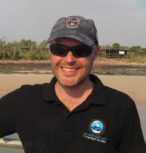DNA reveals the past and future of coral reefs
New DNA techniques are being used to understand how coral reacted to the end of the last ice age in order to better predict how they will cope with current changes to the climate. James Cook Univer

From 2005 to 2022, the main node of the ARC Centre of Excellence for Coral Reef Studies was headquartered at James Cook University in Townsville, Queensland (Australia)








Abstract. Coralline algae are important foundation species in reefs from the tropics to the poles. They provide important ecosystem services such as provision of settlement substrate for marine invertebrates (including corals), and act to bind together reef substrate and even create reefs in some regions. Coralline algae are predicted to be one of the taxa most at risk from ocean acidification and warming. However, how and why coralline algae will respond to future ocean acidification and warming is actually poorly understood. In my presentation, I give an overview that tackles the following questions with respects to coralline algae: 1) How is calcification physiology impacted by ocean acidification? 2) What components of seawater carbonate chemistry under ocean acidification influence calcification (e.g. changes in dissolved inorganic carbon, pH or saturation state)? 3) How is calcification influenced by pH variability? 4) Will the effects of past pH-history alter responses to ocean acidification when assessed over single or multiple generations? I end by summarising what is now needed to better predict coralline algal responses to future ocean acidification.
Biography. Christopher is currently a Research Fellow at the UWA node of the ARC Centre of Excellence for Coral Reef Studies, and will commence a Rutherford Discovery Fellowship in early 2018 at Victoria University of Wellington in New Zealand. He completed a PhD at the University of Otago, in Dunedin New Zealand examing how pH variability in kelp forests could alter the impacts of ocean acidification on resident coralline algae. In 2013 to 2015 he worked at IMAS at the University of Tasmania. Most of his past work assessed how macroalgal-based ecosystems will respond to ocean acidification. He currently works with Professors Malcolm McCulloch and Ryan Lowe, applying knowledge of processes in temperate systems to coral reef settings. At UWA he also works alongside Dr Steeve Comeau to ask some of the big questions in ocean acidification science regarding how and why calcification processes of coralline algae and corals will be influenced ocean acidification. This seminar will explore some of those important findings for coralline algae.
New DNA techniques are being used to understand how coral reacted to the end of the last ice age in order to better predict how they will cope with current changes to the climate. James Cook Univer
A new study on the effects of climate change in five tropical countries has found fisheries are in more trouble than agriculture, and poor people are in the most danger. Distinguished Profess
James Cook University researchers have found brightly coloured fish are becoming increasingly rare as coral declines, with the phenomenon likely to get worse in the future. Christopher Hemingson, a
Researchers working with stakeholders in the Great Barrier Reef region have come up with ideas on how groups responsible for looking after the reef can operate more effectively when the next bleaching
Abstract: As marine species adapt to climate change, their heat tolerance will likely be under strong selection. Individual variation in heat tolerance and its heritability underpin the potential fo
Abstract: The Reef Ecology Lab in KAUST’s Red Sea Research Center explores many aspects of movement ecology of marine organisms, ranging from adult migrations to intergenerational larval dispersal
Abstract: Macroalgal meadows are a prominent, yet often maligned component of the tropical seascape. Our work at Ningaloo reef in WA demonstrate that canopy forming macroalgae provide habitat for ad
Abstract: Sharks are generally perceived as strong and fearsome animals. With fossils dating back at least 420 million years, sharks are not only majestic top predators but they also outlived dinosa
Abstract: Connectivity plays a vital role in many ecosystems through its effects on fundamental ecological and evolutionary processes. Its consequences for populations and metapopulations have been
Abstract: Evolution of many eukaryotic organisms is affected by interactions with microbes. Microbial symbioses can ultimately reflect host’s diet, habitat range, and even body shape. However, how
Abstract: The past few years have seen unprecedented coral bleaching and mortality on the Great Barrier Reef (GBR) but the consequences of this on biodiversity are not yet known. This talk will expl